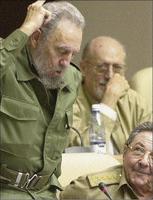
Fidel Castro's resignation as president of Cuba has been felt in neighbouring Jamaica, with which he has had a relationship throughout his time as leader since 1959.
Castro announced his resignation via the online edition of the official communist party newspaper, Granma. In a letter to the people of Cuba, signed by the 81-year-old leader, he said he would not "aspire to nor accept" the post of president of the council of state and commander-in-chief.Dr Kenneth Baugh, deputy prime minister and minister of foreign affairs and foreign trade, lauded Castro's achievements as leader of Cuba. He said he did not expect the ties between Jamaica and Cuba to wane because of the resignation."Whereas he is considered controversial and enigmatic in respect of his political ideology and economic policies, he has had enormous impact on the area of social services, on equality and working for the common good, especially for oppressed peoples of the world in education and health care," Baugh told The Gleaner yesterday.
Cuban assistance
Jamaica, which lies 90 miles south of Cuba, has benefited from assistance under Castro's watch.In health care, Jamaican citizens have received free eye care through the Jamaica-Cuba 'Miracle Eye Care Programme'. Since it began in 2005, more than 11,000 patients have been screened and more than 3,800 ope-rations have been conducted.Castro courted controversy in Jamaica as well. In the 1970s, he became a close friend of the Jamaican Government as Prime Minister Michael Manley touted democratic socialism. The tide, however, turned when the Jamaica Labour Party won the election and Prime Minister Edward Seaga expelled Cuban Ambassador to Jamaica, Ulises Estrada, and severed ties with that country."He certainly created a tremendous social sector with achievements in health and education," he told The Gleaner/Power 106 newsroom. "One can't speak positively about his human rights record - that has been shabby, and his economic results have been very poor. Only recently, since he has embraced some of the market system into his programme, has he been able to obtain any meaningful growth in Cuban economy."
50 years of Castro
A glance at key events in Cuba's history under Fidel Castro:
January 1, 1959 - Castro's rebels take power as dictator Fulgencio Batista flees Cuba.
June 1960 - Cuba nationalises United States-owned oil refineries after they refuse to process Soviet oil. Nearly all other US businesses expropriated by October.
October 1960 - Washington bans exports to Cuba other than food and medicine.
April 16, 1961 - Castro declares Cuba socialist state.
April 17, 1961 - Bay of Pigs: CIA-backed Cuban exiles stage failed invasion.
February 7, 1962 - Washington bans all Cuban imports.
October 1962 - US blockade forces removal of Soviet nuclear missiles from Cuba. US President John F. Kennedy agrees privately not to invade Cuba.
March 1968 - Castro's government takes over almost all private businesses.
April 1980 - Mariel Boatlift: Cuba says anyone can leave; some 125,000 Cubans flee.
December 1991 - Collapse of Soviet Union devastates Cuban economy.
August 1994 - Castro declares he will not stop Cubans trying to leave; some 40,000 take to sea heading for United States.
March 18, 2003 - Seventy-five Cuban dissidents sentenced to prison.
July 31, 2006 - Castro announces he has had operation, temporarily cedes power to brother Raúl.
February 19, 2008 - Castro resigns as president.
- Taken from the Associated Press

